Enlightened absolutism
| Part of a series of articles on |
| Monarchy |
|---|
.svg.png) |
|
Central concepts |
|
History |
| Politics portal |
Enlightened absolutism (also called enlightened despotism or benevolent despotism) refers to the conduct and policies of European absolute monarchs during the 18th and 19th centuries who were influenced by the ideas of the Enlightenment, espousing them to enhance their power.[1] The concept originated during the Enlightenment period in the 18th and into the early 19th centuries.
An enlightened despot is a non-democratic or authoritarian leader who exercises their political power for the benefit of the people, rather than exclusively for themselves or elites.
Enlightened despots distinguished themselves from ordinary despots by claiming to rule for their subjects' well-being. They may focus government priorities on healthcare, education, nonviolent population control, or physical infrastructure. The leader may profess a commitment to peaceful relations and/or allow some democratic decision-making, such as public referenda, but would not propose reforms that undermined their sovereignty or disrupted the social order; "Despotism is a legitimate mode of government in dealing with barbarians, provided the end be their improvement."[2]
Enlightened despots' beliefs about royal power were typically similar to those of regular despots, both believing that they were destined to rule. Enlightened rulers may have played a part in the abolition of serfdom in Europe.[3]
The enlightened despot Emperor Joseph II of Austria summarized, "Everything for the people, nothing by the people".[4]
History
Enlightened absolutism is the theme of an essay by Frederick the Great, who ruled Prussia from 1740 to 1786, defending this system of government.[5] When the prominent French Enlightenment philosopher Voltaire fell out of favor in France, he eagerly accepted Frederick's invitation to live at his palace. He believed that an enlightened monarchy was the only real way for society to advance. Frederick was an enthusiast of French ideas. Frederick explained: "My principal occupation is to combat ignorance and prejudice ... to enlighten minds, cultivate morality, and to make people as happy as it suits human nature, and as the means at my disposal permit."[6]
Enlightened absolutists held that royal power emanated not from divine right but from a social contract whereby a despot was entrusted with the power to govern through a social contract in lieu of any other governments. The monarchs of enlightened absolutism strengthened their authority by improving the lives of their subjects. This philosophy implied that the sovereign knew that the interests of his or her subjects better than they themselves did. The monarch taking responsibility for the subjects precluded their political participation.
The difference between an absolutist and an enlightened absolutist is based on a broad analysis of the degree to which they embraced the Age of Enlightenment. For example, although Empress Catherine II of Russia entirely rejected the concept of the social contract, she embraced many ideas of the Enlightenment, being one of the great patrons of the arts in Imperial Russia and incorporating many ideas of Enlightenment philosophers, especially Montesquieu, in her Nakaz, which was intended to revise Russian law.
However, historians debate the actual implementation of enlightened absolutism. They distinguish between the "enlightenment" of the ruler personally, versus that of his or her regime. For example, Frederick the Great was tutored in the ideas of the French Enlightenment in his youth, and maintained those ideas in his private life as an adult, but in many ways was unable or unwilling to effect enlightened reforms in practice.[7] Other rulers such as the Marquis of Pombal, prime minister of Portugal, used the ideas and practices of the Enlightenment not only to achieve reforms but also to enhance autocracy, crush opposition, suppress criticism, advance colonial economic exploitation, and consolidate personal control and profit.
The concept of enlightened absolutism was formally described by the German historian Wilhelm Roscher in 1847[8] and remains controversial among scholars.[9]
Political reforms
The most important political reforms these monarchs instituted in their kingdoms included:
- Codifying the laws of their territories.
- Reforming the countryside by establishing who owned which land and by reporting this data in property surveys called cadasters.
- Abolishing, or taking steps to abolish, aristocratic tax immunities.
- Limiting the nobility's power to police and pass judgement upon their peasants.
- Diminishing peasants' legal disabilities, including ameliorating, if not abolishing, the hereditary status and impositions of serfdom where they still existed.
- Promoting commerce (whether directly, through royal manufactures, or indirectly, through subsidies, tariffs, the reduction of tolls, or the improvement of transportation).
- Establishing some measure of religious toleration.
- Sponsoring cultural activities and institutions (such as individual philosophies, royal academies, libraries, and essay contests).
Major nations
Governmental responses to the Age of Enlightenment varied widely. In several nations with powerful rulers, called "enlightened despots" by historians, leaders of the Enlightenment were welcomed at Court and helped design laws and programs to reform the system, typically to build stronger national states.[10]
In France, the government's posture was one of hostility and philosophers fought government censorship. The British government generally ignored the Enlightenment's leaders. Charles III, King of Spain from 1759 to 1788, sought to rescue his empire from decay through ambitious reforms such as weakening the Church and its monasteries, promoting science and university research, facilitating trade and commerce, modernizing agriculture, and avoiding war. Spain relapsed into former patterns after his death.[11]
Empress Catherine the Great, who ruled Russia from 1762 to 1796, had an enthusiastic response toward Enlightenment ideas. Emperor Joseph II, ruler of Austria from 1780 to 1790, was over-enthusiastic, announcing so many reforms with so little support that revolts broke out and his regime reverted to a comedy of errors.[12]
Senior ministers, such as the Marquis of Pombal, who was Joseph I of Portugal's Secretary of State, and Struensee in Denmark, did govern amicably with Enlightenment ideals.
Associated rulers
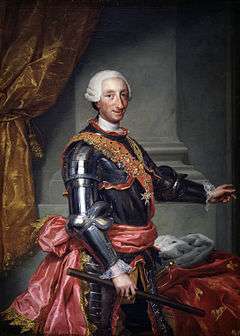
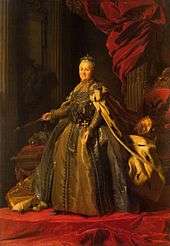
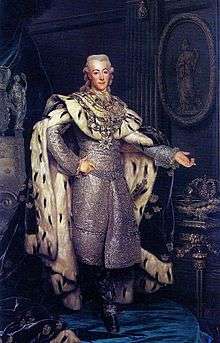
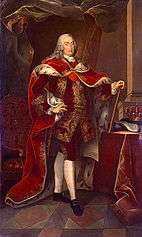
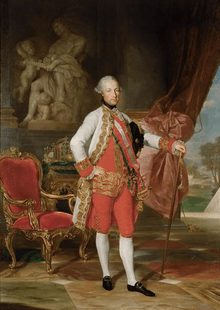
%2C_rev%C3%AAtu_du_grand_costume_royal_en_1779_-_Google_Art_Project.jpg)
- Napoleon Bonaparte
- Catherine the Great of Russia[13]
- Charles III of Spain[14]
- Frederick the Great of Prussia[15]
- Frederick VI of Denmark[16]
- Gustav III of Sweden[16]
- Joseph II, Holy Roman Emperor of Austria[14]
- Joseph I of Portugal (through his minister, the Marquis of Pombal)
- Maria Theresa
- Leopold I, Grand Duke of Tuscany[14]
- Louis XVI of France[14]
- Maria Carolina of Austria, Queen of Naples[17]
- Christian VII of Denmark (through his minister Johann Friedrich Struensee)
- Gabriel Bethlen, King Of Hungary, Prince of Transylvania
Leaders such as Napoleon Bonaparte, Fidel Castro, Benito Mussolini (at least until the war against Ethiopia), António Salazar, Joseph Stalin, Isaias Afwerki, Mustafa Kemal Atatürk, Lee Kuan Yew, Mao Zedong, Pervez Musharraf and the Medici dynasty adopted the title. Long-seated dictators are more likely to be regarded as enlightened because they acknowledge public interest in order to remain in power and to be regarded as legitimate.
In Spanish the word dictablanda is sometimes used for a dictatorship that preserves some of the liberties and mechanisms of democracy.
Chinese Legalism
Xuezhi Guo contrasts the Confucian ideal of a "humane ruler" (renjun) with the ideal of Chinese Legalists, who he says "intended to create a truly 'enlightened ruler' (mingjun) who is able to effectively rule the masses and control his bureaucracy"; this ruler would be a "skilful manipulator and successful politician who uses means or 'technique' in achieving self-protection and political control." Guo quotes Benjamin I. Schwartz as describing the features of "a truly Legalist 'enlightened ruler'":[18]
He must be anything but an arbitrary despot if one means by a despot a tyrant who follows all his impulses, whims and passions. Once the systems which maintain the entire structure are in place, he must not interfere with their operation. He may use the entire system as a means to the achievement of his national and international ambitions, but to do so he must not disrupt it's impersonal workings. He must at all times be able to maintain an iron wall between his private life and public role. Concubines, friends, flatterers and charismatic saints must have no influence whatsoever on the course of policy, and he must never relax his suspicions of the motives of those who surround him.[19][18]
See also
- Opposing theories
References
- ↑ Perry, Chase & Jacob 2015, p. 442.
- ↑ Mill 1989, p. 13.
- ↑ "Disappearance of Serfdom. France. England. Italy. Germany. Spain". www.1902encyclopedia.com. Retrieved 2015-12-07.
- ↑ World of the Habsburgs. "Joseph II: The long-awaited son". Textmode. World of the Habsburgs. Retrieved 2015-10-21.
‘Everything for the people, nothing by the people’
- ↑ Reprinted in Isaac Kramnick (1995). The Portable Enlightenment Reader. Penguin Books. ISBN 978-0-14-024566-0. Retrieved 26 August 2013.
- ↑ Giles MacDonogh, Frederick the Great: A Life in Deed and Letters (2001) p. 341
- ↑ H.M. Scott, ed., Enlightened Absolutism: Reform and Reformers in Later Eighteenth-Century Europe, (University of Michigan Press, 1990)
- ↑ A. Lentin (ed.), Enlightened Absolutism (1760-1790), Aveiro, 1985, p. ix.
- ↑ Charles Ingrao, "The Problem of 'Enlightened Absolutism and the German States," Journal of Modern History Vol. 58, Supplement: Politics and Society in the Holy Roman Empire, 1500–1806 (Dec., 1986), pp. S161–S180 in JSTOR
- ↑ Stephen J. Lee, Aspects of European history, 1494–1789 (1990) pp. 258–66
- ↑ Nicholas Henderson, "Charles III of Spain: An Enlightened Despot," History Today, Nov 1968, Vol. 18 Issue 10, pp. 673–82 and Issue 11, pp. 760–68
- ↑ Nicholas Henderson, "Joseph II", History Today (March 1991) 41:21–27
- ↑ McKay, "A History of Western Society", Houghton Mifflin Company, 2006, pp.616–19
- Catherine the Great: Portrait of a Woman R K. Massie, "Catherine the Great: Portrait of a Woman", Random House, 2012
- 1 2 3 4 H.M. Scott, 1990, p. 1.
- ↑ H.M. Scott, 1990, pp. 265ff
- 1 2 H. Arnold Barton, Scandinavia in the Revolutionary Era 1760–1815, University of Minnesota Press, 1986, pp.142ff. ISBN 0-8166-1392-3.
- ↑ Bearne, Catherine Mary (1907). A Sister of Marie Antoinette: The Life-Story of Maria Carolina, Queen of Naples. T. Fisher Unwin: London, p. 142.
- 1 2 Guo, Xuezhi (2002). The Ideal Chinese Political Leader: A Historical and Cultural Perspective. Westport, CT: Praeger Publishers. p. 141.
- ↑ Benjanmin I. Schwartz p. 345, The World of Thought in Ancient China
- Biography.com Editors. "Joseph II Biography". A&E Television Networks. Retrieved 2015-10-21.
- Mill, John Stuart (25 August 1989). J. S. Mill: 'On Liberty' and Other Writings. Cambridge University Press. ISBN 978-0-521-37917-5.
- Perry, Marvin; Chase, Myrna; Jacob, James; Jacob, Margaret; Daly, Jonathan (1 January 2015). Western Civilization: Ideas, Politics, and Society, Volume I: To 1789. Cengage Learning. ISBN 978-1-305-44548-2. Retrieved 20 September 2015.
- World of the Habsburgs. "Joseph II: The long-awaited son". Textmode. World of the Habsburgs. Retrieved 2015-10-21.
‘Everything for the people, nothing by the people’
- "Enlightened despotism". Britannica.
Further reading
- John G. Gagliardo. Enlightened despotism (1967)
- Leo Gershoy. From despotism to revolution, 1763–1789 (1963)
- H. M. Scott, ed. Enlightened Absolutism: Reform and Reformers in Later Eighteenth-Century Europe (1990)